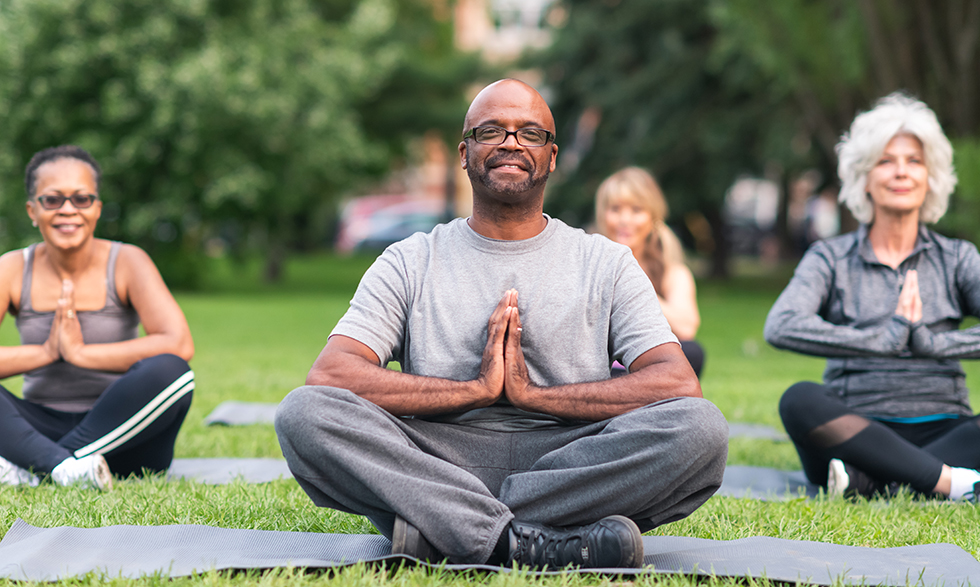
Last updated on June 19th, 2024 at 10:33 am
It’s a time to celebrate getting older, but caring for your body, mind, mental health, and relationships has health benefits no matter your age.
These science-based tips can help you stay healthy, happy, and independent for years to come.
Get moving
Physical exercise can increase mobility, help prevent falls and fractures, and reduce the risk of some diseases associated with aging. It can also give the brain a boost, which can help with tasks like processing information, learning new things, paying attention, and solving problems.
These kinds of exercise are especially important as you get older:
- Endurance and aerobic exercises such as hiking, biking, dancing, and swimming, which strengthen your heart and lungs and boost circulation
- Strength exercises such as weightlifting, resistance band workouts, and carrying groceries, which keep your muscles strong
- Balance exercises such as tai chi and standing on one foot, which help improve coordination and build strength to reduce the risk of falls and fractures
- Flexibility exercises and stretches such as yoga, which can help keep you limber and protect you from injuries
Experts recommend aiming for 2.5 hours of physical exercise each week, which is only slightly more than 21 minutes per day. Get more tips for getting (and staying) physically active as you age.
Eat healthy
A diet that includes plenty of nutrients, vitamins, and minerals keeps your brain and body healthy and may reduce your risk of some aging-related diseases.
- Prioritize nutrient-rich foods such as seafood, plant-based proteins like nuts and seeds, and lean (low-fat) meats and poultry.
- Limit foods with unhealthy additives such as added sugars and saturated fats.
- Say “yes” to fruits and vegetables. Research shows that eating five servings of fruits and vegetables every day can reduce your risk of some chronic diseases.
- Watch your portion size. Keep an eye on how much you are eating and talk to your doctor about how many calories are right for you and your lifestyle.
A Mediterranean-style diet―which includes nuts, vegetables, and fish―is one example of a diet that’s good for heart health and may support the brain’s ability to think and remember.
Prioritize your physical health
Small changes add up. Start today for greater health benefits later in life.
- Drink less alcohol. Alcohol can contribute to health problems, especially as you get older. If you drink, try sticking to one drink a day or less, or stop drinking altogether.
- Prioritize sleep. Aim for seven to nine hours of sleep each night. A bedtime routine and a regular sleep schedule can help develop good sleep hygiene.
- Quit smoking and tobacco use. If you use tobacco, dropping the habit now will help you feel better right away and can add years to your life, even if you’ve been smoking for a long time.
- Keep up on your health care. Make sure to get regular checkups and stay up to date on your health screenings and vaccinations.
Care for your mental health
- Keep your stress in check. Chronic stress can damage the brain and body, including the parts of the brain involved with learning and memory. Strategies like getting regular exercise, meditating, and connecting with friends and family can help you manage stress.
- Speak up if you feel down. If you’re struggling with mental health, don’t be afraid to reach out. Mental health help is available!
Nurture your relationships
No matter your age, feeling lonely and socially isolated can be harmful to your physical, emotional, and cognitive health. Developing and maintaining strong social ties can help you feel more engaged and connected.
Try:
- Volunteering for a local organization.
- Scheduling regular check-ins with friends and family who live far away.
- Connecting with other people in your community. Get to know your neighbors or join a local club.
Engage your mind
Exercising your brain is just as important as exercising your body. Activities that challenge your brain on a regular basis keep your mind active and healthy and may help slow cognitive decline as you get older.
Try:
- Learning something new like a new skill, language, or game.
- Getting out and about―you could visit a museum or try an exercise class.
- Spending time on your hobbies―for example, reading a book, playing the guitar, or cooking a nourishing meal.
Join a clinical study
Scientists are learning new things about the aging process and the best ways to support health, well-being, and healthy aging throughout life. Participating in a clinical research study is a great way to contribute to the scientific process and improve lives. Find out more about clinical research and how to volunteer for studies.
What we know about the science of healthy aging
Every day, NIH-funded scientists are making discoveries about aging process, age-related diseases and conditions, and ways to help people live longer, healthier lives.
What Do We Know About Healthy Aging? is a free booklet from the National Institute on Aging (NIA) that breaks down the science of healthy aging and provides steps you can take today to optimize your health as you grow older.
What Do We Know About Healthy Aging? is available as a PDF download or paper publication that you can share with friends and loved ones.
